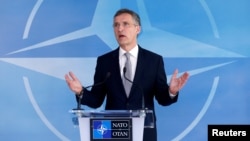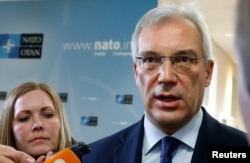NATO and Russia held their first dialogue in two years this week.
The meeting among ambassadors of the alliance and Russia in Brussels Wednesday failed to produce agreements, but analysts say it has raised hope that Russia may be making a new effort to emerge from isolation following its annexation of Crimea and support for separatist rebels in eastern Ukraine.
Russia is still under sanctions from the United States and other members of NATO, which called on Russian forces to stop their actions to destabilize eastern Ukraine and protested the annexation of Crimea.
At the meeting, officials gave no indication that Russia is ready to make any concessions, such as withdrawing its support, in both personnel and weaponry, for separatist rebels in eastern Ukraine.
“We had a frank and serious discussion,” said NATO Secretary-General Jens Stoltenberg, but he said differences between Moscow and the alliance are persistent and deep. He said there remain “profound disagreements.”
The meeting came at a time when relations between NATO and Russia are at their lowest since the Cold War. Aside from differences over Ukraine, tensions have been raised by a string of incidents involving the U.S. and Russian militaries that Washington and NATO have condemned as dangerous and unprofessional.
The latest was last week, when a Russian airplane buzzed a U.S. destroyer and a U.S. reconnaissance aircraft over the Baltic Sea.
U.S. and NATO officials called the meeting with the hope of opening communication and eventually updating their agreements to prevent accidents and misunderstandings during military maneuvers.
Russia had good reasons for attending the session.
“I don’t think Russia has any intent in being seen as a rogue state or somehow isolated,” said Samuel Greene, director of the Russia Institute at King’s College London. “They clearly don’t agree with the West, but they do see themselves as part of the global equation and remain interested in communicating.”
Showing a willingness to emerge from isolation is important for Moscow. The EU extended its sanctions in December but they are due to expire in July. With Germany and France pressing to review and eventually lift them, analysts say Russia sees a real possibility that the sanctions could soon be lifted or at least reduced.
Following an impressive performance in Syria, where Russian-backed forces helped the government of President Bashar al-Assad drive back rebels and retake considerable amounts of territory, Russia came to the table in Brussels in a position of strength.
“Russia believes it has proven it is relevant and has the capacity to insert itself into equations that are important to Washington and to NATO,” Greene said.
Neither the U.S. nor NATO has security agreements with Ukraine. With the Ukrainian government failing to enact anti-corruption measures at a rate acceptable to the EU and the Ukraine conflict no longer making headlines in the West, analysts say it is not unlikely that Europe may move to begin lifting sanctions soon, or at the very least, improving ties with Moscow.
Boosting military-to-military communication between Moscow and NATO to avoid confrontations could be one first step. Talks in Brussels on Wednesday went nearly four hours longer than scheduled, a sign that while neither side is willing to make concessions, it is willing to talk.
In a move that could help further thaw relations with Russia, Douglas Lute, the U.S. ambassador to NATO, said Friday there is no chance of NATO expansion anytime soon.
"There's no way we're going to get consensus any time in the near future” on adding Georgia or Ukraine, he told the Aspen Security Forum in London.





